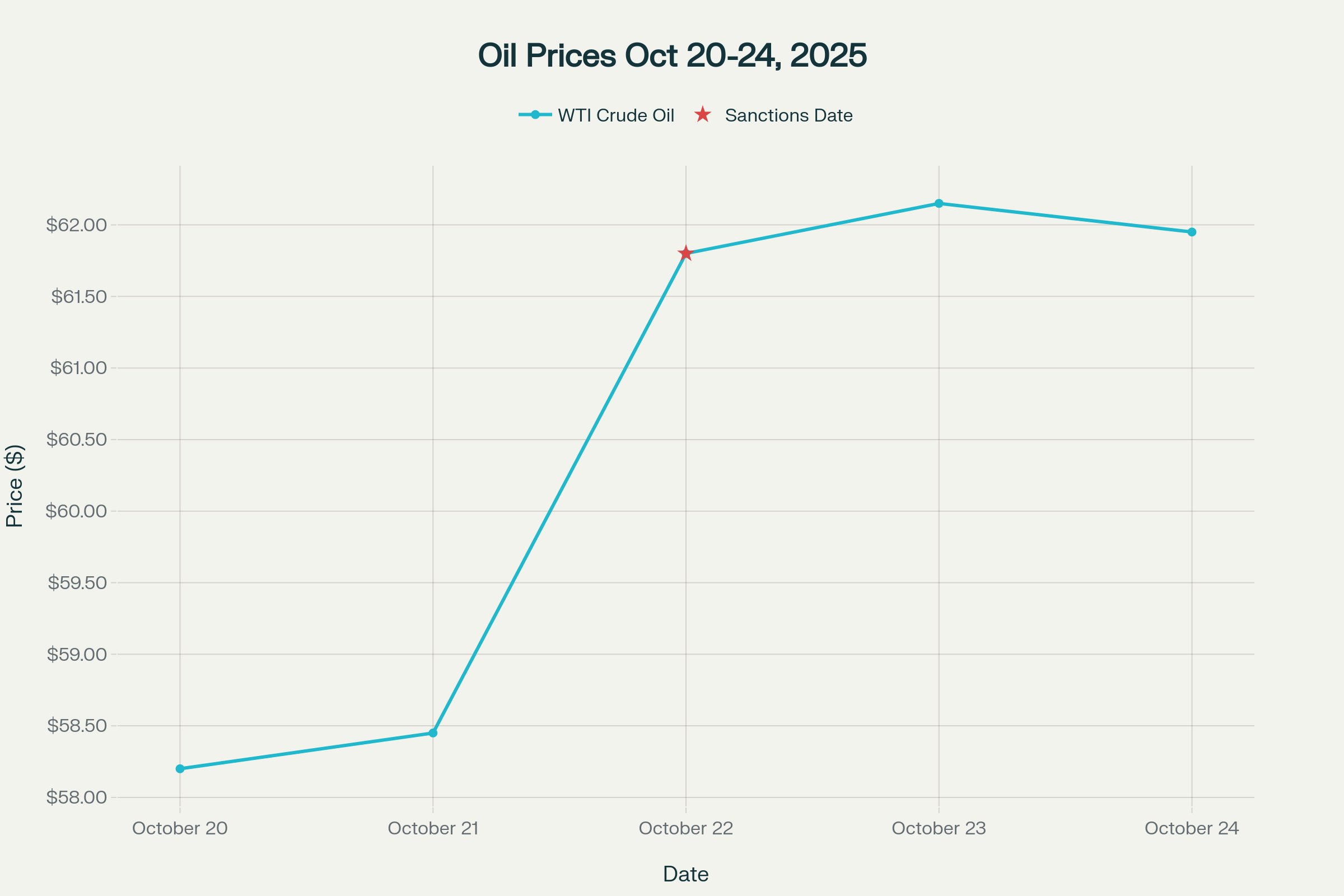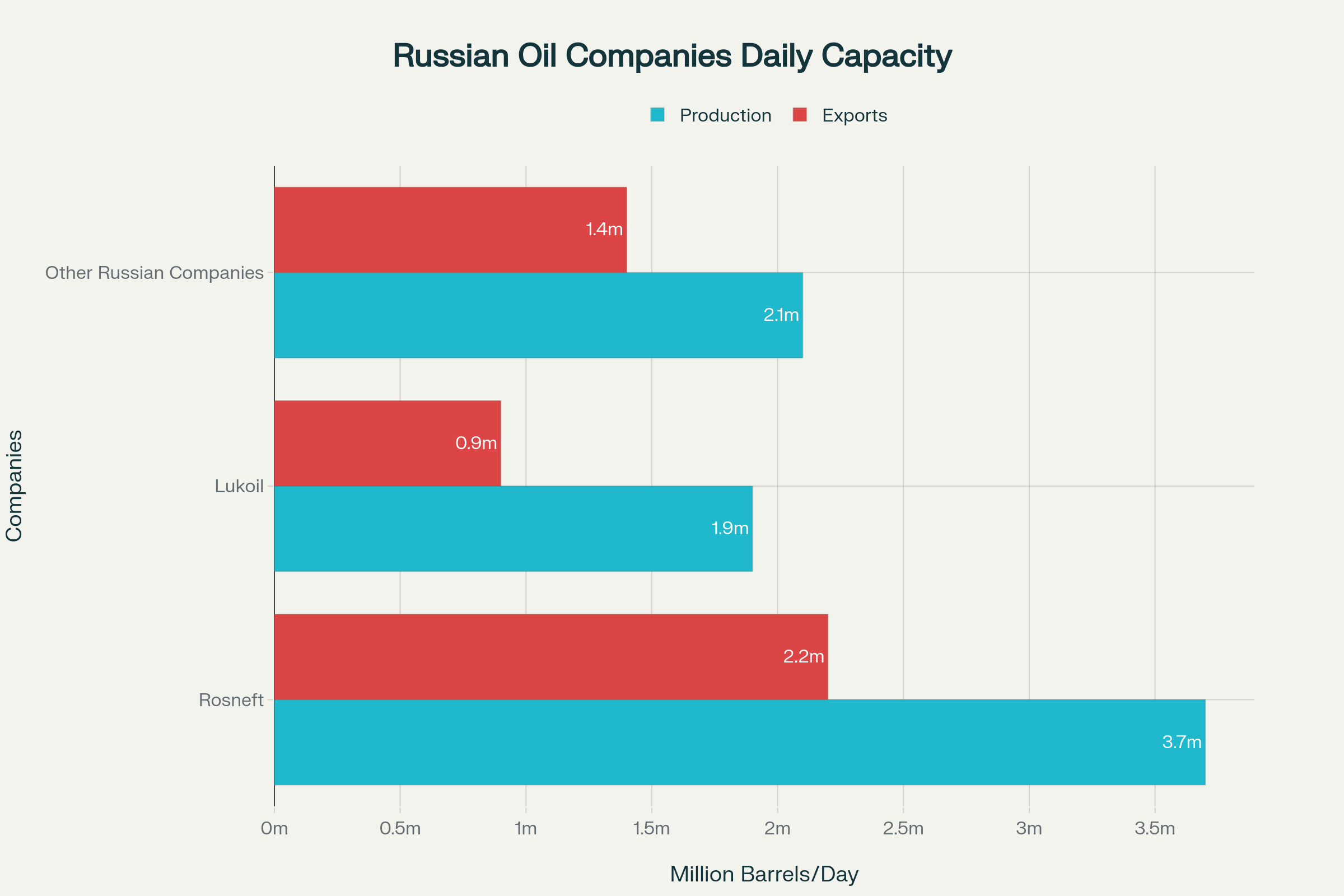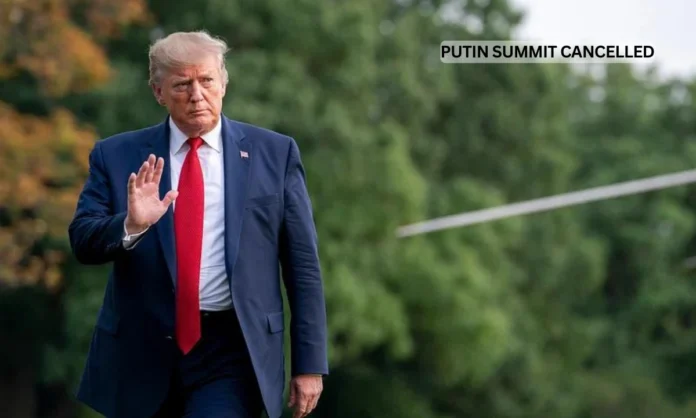Key Highlights
- Trump cancels Putin summit citing Russia’s insufficient commitment to Ukraine peace negotiations and lack of diplomatic progress
- US Treasury imposes comprehensive sanctions on Rosneft and Lukoil, targeting 3.1 million barrels per day of Russian oil exports
- Oil prices surge 5-6% following Trump cancels Putin summit announcement, reaching $62 per barrel amid supply disruption fears
Opening Overview
President Donald Trump’s decision to cancel his planned summit with Vladimir Putin represents a pivotal moment in US-Russia diplomatic relations, signaling Washington’s frustration with Moscow’s intransigence on Ukraine peace negotiations. The Trump cancels Putin summit announcement, delivered during a White House briefing, coincided with the most comprehensive sanctions package targeting Russian energy infrastructure since the Ukraine conflict began. This strategic diplomatic shift reflects Trump’s evolving approach toward Russia, abandoning what he termed potentially “wasted meetings” in favor of maximum economic pressure through sanctions targeting Rosneft and Lukoil, which collectively export 3.1 million barrels of oil daily.
.@POTUS: "These are tremendous sanctions. These are very big against their two big oil companies — and we hope that they won't be on for long. We hope that the war will be settled." https://t.co/6vbswraYmV pic.twitter.com/FONI7ECFAw
— Rapid Response 47 (@RapidResponse47) October 22, 2025
The Trump cancels Putin summit decision carries profound implications for global energy markets and diplomatic relations, as the cancelled meeting was initially planned for Budapest following recent phone conversations between the leaders. Trump’s explanation that the meeting “didn’t feel right” underscores his administration’s strategic pivot toward economic warfare rather than diplomatic engagement with Moscow. The timing of the Trump cancels Putin summit announcement alongside sweeping oil sanctions demonstrates coordinated pressure designed to force Russia toward meaningful peace negotiations while simultaneously strengthening Trump’s position ahead of his confirmed meeting with Chinese President Xi Jinping in South Korea.
Economic Warfare: Sanctions Impact on Russian Energy Giants
The Trump cancels Putin summit decision was strategically coordinated with the Treasury Department’s announcement of comprehensive sanctions targeting Russia’s two largest oil companies, Rosneft and Lukoil, which together account for approximately 70 percent of Russia’s crude oil exports. These sanctions, implemented under Executive Order 14024, effectively blacklist companies responsible for 3.7 million barrels per day of oil production, representing nearly 6 percent of global output. The economic impact was immediate, with oil prices surging 5-6 percent following the Trump cancels Putin summit announcement, as markets priced in potential supply disruptions affecting major Asian importers including China and India.
- Rosneft produces 3.7 million barrels daily, contributing 6% of global oil production and nearly half of Russian output
- Lukoil exports 900,000 barrels daily, representing the largest privately-owned Russian energy company
- Combined sanctions target companies generating approximately $150 billion annually in oil revenues for Russias3.amazonaws
The market response to the Trump cancels Putin summit and accompanying sanctions demonstrates their significant economic leverage, with energy analysts noting that the timing coincides with favorable global supply conditions. The Atlantic Council estimates that enforcement could drive oil prices to $80 per barrel or higher, though abundant global spare capacity from Saudi Arabia and other producers mitigates potential consumer impact. Treasury Secretary Scott Bessent emphasized that these measures aim to “degrade the Kremlin’s ability to raise revenue for its war machine,” targeting the financial infrastructure that has sustained Russia’s military operations in Ukraine.

Oil Price Response to Trump’s Putin Summit Cancellation and Russian Sanctions
Diplomatic Timeline: From Engagement to Confrontation
The Trump cancels Putin summit represents a dramatic shift from the administration’s earlier diplomatic approach, which included multiple high-level meetings and phone conversations throughout 2025. Trump and Putin’s relationship has evolved through seven face-to-face encounters since 2017, including their most recent meeting in Alaska in August 2025, where Trump warned of “severe consequences” if Russia failed to agree to a ceasefire. The Trump cancels Putin summit decision follows a pattern of escalating ultimatums, including Trump’s July deadline requiring Russia to end the war within 50 days or face 100 percent tariffs on countries purchasing Russian oil.
- Trump issued multiple ceasefire deadlines to Putin throughout 2025, with Russia consistently failing to meet terms
- The cancelled Budapest summit was planned following their August 2025 Alaska meeting where Putin was given final warnings
- US Special Envoy Steve Witkoff met with Putin in Moscow just days before the latest deadline expired
The evolution from the Trump cancels Putin summit decision reflects the administration’s growing frustration with what officials describe as Russia’s “emotional” responses to diplomatic pressure and continued military escalation in Ukraine. Trump’s previous statements about having “wonderful conversations” with Putin that ultimately “don’t go anywhere” underscore the futility that led to the summit cancellation. This diplomatic trajectory demonstrates Trump’s transactional approach to international relations, where continued engagement requires tangible progress toward stated objectives, particularly regarding Ukraine peace negotiations.
Market Analysis: Oil Price Volatility and Supply Chain Disruption
The Trump cancels Putin summit announcement triggered immediate market volatility, with West Texas Intermediate crude futures jumping from $58.45 to $61.80 per barrel within hours of the sanctions announcement. Energy markets had previously discounted the possibility of escalation due to Trump’s emphasis on maintaining low domestic energy prices, making the comprehensive sanctions package a significant surprise to traders. The Trump cancels Putin summit decision, coupled with sanctions targeting 3.1 million barrels per day of Russian exports, represents the most significant supply-side shock to global oil markets since the initial Ukraine invasion.
- Chinese state-owned oil companies immediately suspended new seaborne purchases of Russian crude following sanctions
- Indian refiners are reviewing existing contracts with Rosneft and Lukoil subsidiaries to assess compliance risks
- Energy futures markets are pricing in temporary loss of 500,000 to 1 million barrels per day from Russian suppliess3.amazonaws
The broader economic implications of the Trump cancels Putin summit extend beyond immediate price volatility, as the sanctions target companies that collectively earned $1.2 trillion rubles ($12.8 billion) in 2024 revenue. Rosneft alone reported a 68 percent year-on-year decline in net income for the first half of 2025, while Lukoil experienced a 27 percent profit decrease, indicating that previous sanctions were already impacting Russian energy revenues. The coordinated nature of US, UK, and EU sanctions creates unprecedented pressure on Russia’s energy sector, though enforcement remains critical to achieving maximum economic impact.

Russian Oil Companies: Production vs Export Capacity (Million Barrels/Day)
Strategic Implications for US-China Relations
The Trump cancels Putin summit decision strategically elevates the importance of Trump’s confirmed October 30 meeting with Chinese President Xi Jinping during the APEC summit in South Korea. By cancelling the Putin summit while maintaining high-level engagement with China, Trump signals a diplomatic realignment that prioritizes economic relationships over what his administration views as unproductive security dialogues with Russia. The Trump cancels Putin summit creates additional leverage in US-China discussions, as Trump has indicated he plans to ask Xi to use China’s influence with Putin to advance Ukraine peace negotiations.
- Current US tariffs on Chinese goods average 51.1 percent, while China maintains 32.6 percent retaliatory tariffs on American products
- The US goods trade deficit with China reached $295.5 billion in 2024, a primary focus of upcoming negotiations
- Trump views China’s relationship with Russia as potentially instrumental in resolving the Ukraine conflict
The contrast between the Trump cancels Putin summit and the confirmed Xi meeting reflects the administration’s calculation that China offers greater potential for achieving concrete diplomatic and economic outcomes. Trump’s emphasis on leveraging China’s relationship with Russia demonstrates his belief that Beijing’s influence over Moscow could prove more effective than direct US-Russia diplomatic engagement. This strategic approach aligns with Trump’s transactional foreign policy philosophy, focusing resources on relationships that offer measurable benefits for American interests while abandoning those that fail to produce results.
Closing Assessment
The Trump cancels Putin summit decision represents a calculated escalation in US-Russia relations, replacing diplomatic engagement with unprecedented economic pressure through comprehensive sanctions targeting Russia’s energy sector. This strategic pivot demonstrates Trump’s willingness to abandon diplomatic tracks that fail to produce tangible results, instead focusing on economic warfare designed to force Moscow toward meaningful Ukraine peace negotiations. The coordination of the Trump cancels Putin summit announcement with sanctions affecting 3.1 million barrels per day of Russian oil exports signals Washington’s commitment to maximum pressure tactics when diplomacy proves insufficient.
The broader implications of the Trump cancels Putin summit extend beyond bilateral US-Russia relations, influencing global energy markets and reshaping diplomatic priorities ahead of crucial meetings with China and other allies. Trump’s decision to cancel the Putin summit while confirming engagement with Xi Jinping reflects a strategic realignment that prioritizes relationships offering concrete economic and diplomatic benefits over those characterized by persistent disagreement. As oil markets continue absorbing the impact of Russian sanctions and diplomatic tensions escalate, the Trump cancels Putin summit may mark a defining moment in the evolution of great power competition and the limits of diplomatic engagement in resolving international conflicts.


